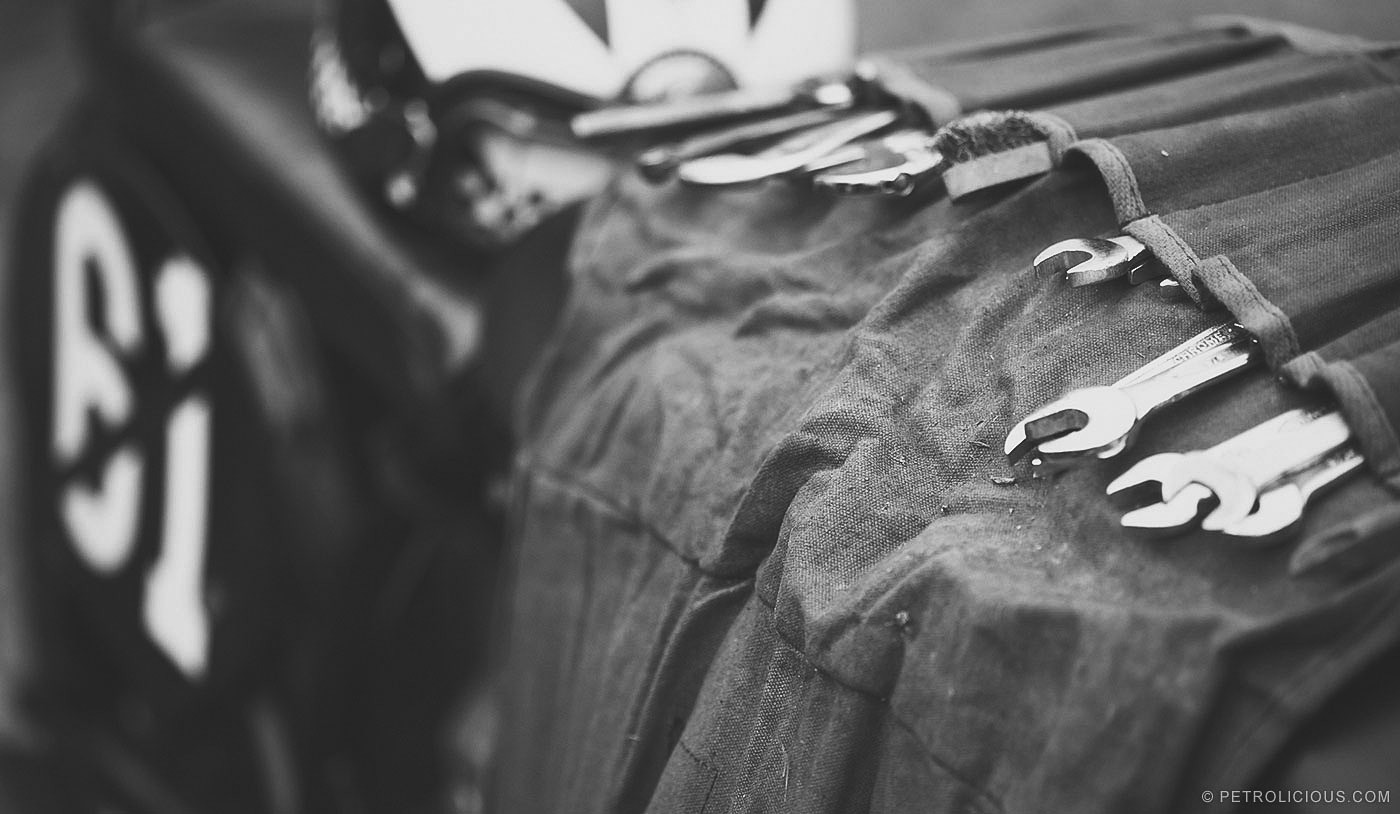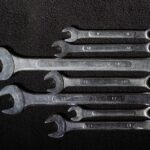There’s a certain romance to driving a classic car, a feeling of connection to automotive history and a more engaging driving experience. However, vintage vehicles can sometimes be temperamental. While the idea of a spontaneous breakdown might seem daunting, especially on a long trip, being prepared with the right tools can turn a potential disaster into a minor inconvenience. Forget just admiring a pristine factory tool kit; a practical, well-stocked Tool Bag For Your Car is your real companion on the road.
Many classic car owners, myself included, enjoy tinkering and performing maintenance. This hands-on experience gives us a good sense of what might need attention. But even with meticulous preparation, unexpected issues can arise, particularly when you venture beyond your local roads. Imagine embarking on a scenic coastal drive, only to be sidelined by a simple problem you could have fixed yourself with the right tools at hand.
While factory-supplied tool kits are often beautiful and historically accurate, their practicality for actual roadside repairs can be limited. They are more for show than go. The real value comes from assembling a tool bag for your car that’s tailored to real-world situations and the specific needs of your vehicle. This isn’t about concours judging; it’s about ensuring you can enjoy the journey with peace of mind.
So, ditch the pristine factory kit for display in your garage and let’s focus on building a travel-ready tool bag for your car. We’ll prioritize functionality and portability, ensuring you have what you need without sacrificing precious trunk space or adding unnecessary weight.
Before we dive into the specifics of what to pack in your tool bag for your car, consider the types of journeys you typically undertake. Are you planning short weekend jaunts close to home, or are you envisioning extended road trips covering hundreds or even thousands of miles? The length and remoteness of your travels will influence the comprehensiveness of your ideal tool bag for your car.
Let’s break down the essential tools to include in your tool bag for your car, focusing on practicality and common roadside fixes:
Fastening and Adjustment Tools:
- Screwdrivers: A selection of Phillips head and flathead screwdrivers in various sizes is fundamental. Consider a multi-bit screwdriver set to save space and offer versatility. These are invaluable for tightening hose clamps, adjusting minor fittings, or even interior trim.
- Socket Set (1/4-inch drive): A 1/4-inch drive socket set is surprisingly versatile for automotive tasks. It handles smaller fasteners commonly found around battery terminals, interior components, and some engine accessories. Include a ratchet, various extensions (including a flexible extension for hard-to-reach spots), and a screwdriver-style handle for added leverage. Don’t forget a selection of Torx bits within this set, as they are increasingly common in vehicle construction.
- Socket Set (3/8-inch drive): For larger fasteners, a 3/8-inch drive set is necessary. Focus on sockets specific to your car. Essential inclusions are a spark plug socket (the correct size for your engine), a deep socket for your lug nuts, and an adapter to use 1/4-inch drive sockets with your 3/8-inch ratchet. Test access to your spark plugs beforehand; if a universal joint is needed for removal, include one in your tool bag for your car.
- Allen Wrenches: A folding set of Allen wrenches (hex keys) is compact and covers a range of sizes for various adjustments and fasteners commonly found in European and other vehicles.
- Wrenches (Combination or Adjustable): Pack a few combination wrenches (open-end and box-end on the same wrench) in sizes specific to your car. For example, German cars often use odd-sized metric bolts, while Japanese cars frequently utilize 12mm bolts. An adjustable wrench (crescent wrench) can also be a useful addition for those less common sizes, but combination wrenches are generally more robust for regular use. To keep wrenches organized in your tool bag for your car, use a bolt, washers, and wing nut to create a compact bundle, as demonstrated in the original article.
Electrical and Wiring Tools:
- Ignition Wire Pliers: These specialized pliers are designed to grip spark plug boots without damaging the wires themselves, crucial for spark plug maintenance or replacement on the roadside.
- Wiring Tools: Electrical issues are common culprits for roadside breakdowns. Include diagonal cutters for wire trimming, a crimper/stripper for making secure electrical connections, a selection of crimp connectors (various sizes and types), and a roll of quality electrical tape for insulation and repairs. A test light with a probe and alligator clip is invaluable for diagnosing electrical problems, helping you trace power flow and identify faults quickly.
- Jumper Cables: Even with a new battery, jumper cables are a must-have in your tool bag for your car. They are essential for jump-starting your own car in case of battery drain, or assisting others, potentially turning a breakdown situation into an opportunity to help a fellow motorist.
Tire and Wheel Tools:
- Breaker Bar: A 24-inch breaker bar provides significant leverage for loosening stubborn lug nuts when changing a tire. Paired with the correct socket for your lug nuts (which should be in your socket sets), it makes tire changes much easier and safer.
- Tire Gauge: Regularly checking tire pressure is crucial for safety and fuel efficiency. A tire pressure gauge is a small but vital tool to keep in your tool bag for your car.
- Tire Inflator: Consider a portable 12V tire inflator (compressor) for your tool bag for your car. This allows you to reinflate a tire after using sealant or to top up pressure as needed, offering more self-sufficiency than relying solely on gas station air pumps.
- Tire Sealant (Fix-a-Flat or Slime): A can of tire sealant can temporarily repair a puncture, allowing you to reach a repair shop safely. While not a permanent fix, it can be a lifesaver in roadside emergencies.
Utility and General Purpose Tools:
- Pliers (Water Pump and Needle Nose): Water pump pliers (adjustable pliers) are incredibly versatile for gripping various shapes and sizes, useful for hose clamps, plumbing fittings (as humorously noted in the original article), and general tasks. Needle-nose pliers are essential for detail work, reaching into tight spaces, and manipulating small components. Electrician-style needle-nose pliers with a crimping function offer added utility. A multi-tool like a Leatherman can also cover these needs efficiently, saving space in your tool bag for your car.
- Vise-Grips: Locking pliers (Vise-Grips) are invaluable for clamping, holding, or even temporarily repairing damaged parts. A set of vise-grips adds significant versatility to your tool bag for your car.
- Utility Knife: A folding utility knife is incredibly handy for a multitude of tasks, from cutting hoses and belts to opening packages and even preparing snacks. As the original article suggests, it can even be used to fashion a makeshift funnel from a plastic bottle if needed.
- Gloves: Protect your hands with a pair of mechanic’s gloves for general repairs and heavier-duty leather work gloves for tasks like tire changes or handling hot components. Include a few pairs of disposable nitrile gloves for cleaner tasks or when dealing with fluids.
Choosing the Right Tool Bag for Your Car:
The final, and perhaps most crucial element, is selecting the right tool bag for your car to house your carefully chosen tools. The goal is a bag that is compact, durable, and keeps your tools organized and readily accessible.
- Size and Portability: Opt for a bag that is large enough to hold your essential tools without being excessively bulky or heavy. Consider the available space in your car’s trunk or storage area. A smaller, more portable bag is preferable to a large, unwieldy one.
- Durability and Material: Choose a tool bag for your car made from robust materials like heavy-duty canvas or nylon to withstand the rigors of travel and protect your tools. Reinforced stitching and a sturdy zipper are essential for longevity.
- Organization: Look for a tool bag with internal pockets, dividers, or elastic straps to keep your tools organized and prevent them from rattling around. Good organization not only protects your tools but also makes it much easier to find the right tool quickly when you need it most. As suggested, repurposing a surplus military bag or even a stylish vintage bag (if you dare!) can add a touch of personality to your tool bag for your car.
Assembling a comprehensive yet compact tool bag for your car is an investment in peace of mind. While this list provides a solid foundation, remember to personalize your kit based on the specific needs and potential quirks of your vehicle. Consider any specialized tools unique to your car model and add them to your tool bag for your car. Being well-prepared means you can embrace the open road with confidence, knowing that minor mechanical hiccups won’t derail your classic car adventures. And remember, stay tuned for a future discussion on essential spare parts to complement your perfectly packed tool bag for your car!


